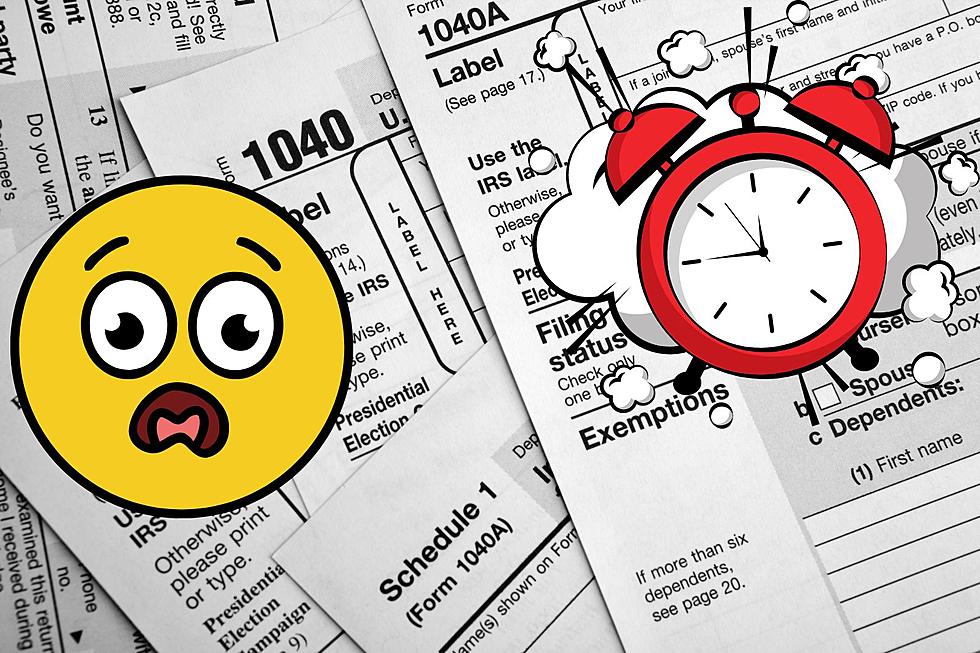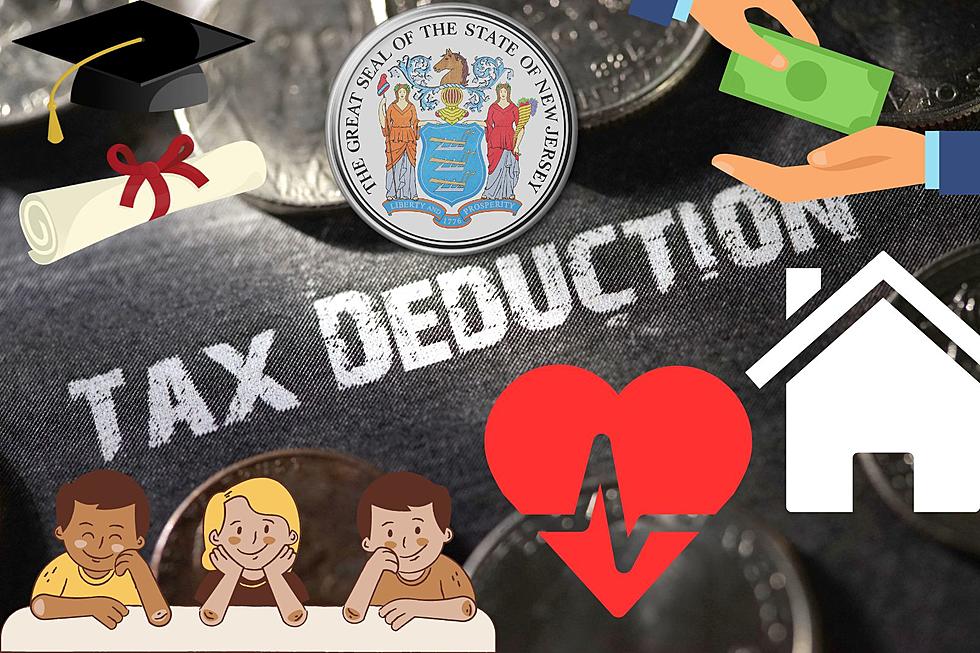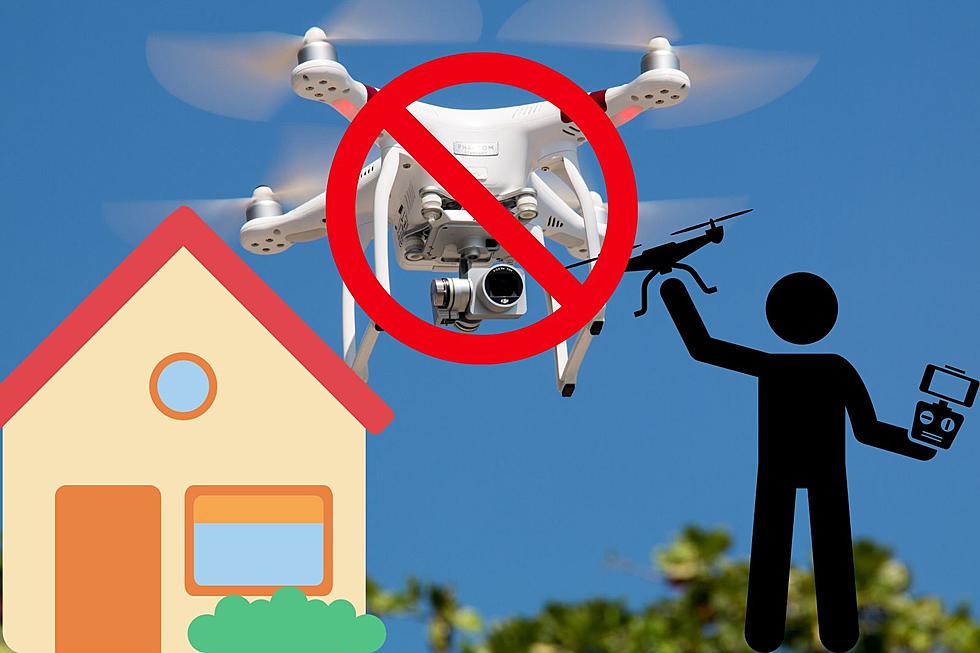
Keep your money: What you need to know before filing taxes in NJ
🔎 The number one thing that will trigger an audit in New Jersey
💲 New Jersey is offering a big new tax deduction this year
✅ When can I expect my refund?
It’s tax season in New Jersey.
You have questions, we get you the answers.
Below are the answers to the questions you are asking about filing taxes in New Jersey.
Please note: This column is intended to provide general information about the tax code in New Jersey, how to file your state tax return and a guide to key deductions. It is not intended as specific tax or legal advice. Please consult a licensed CPA, tax advisor or tax attorney on your own personal situation.
New Jersey doesn’t make it easy
“If you are new to New Jersey, it's going to be an eye-opening experience.”
That from Thomas McCabe, CPA/PFS, CEO of Alliance Wealth Management Group in Flemington.
McCabe got his MBA from Rider University and has been advising on tax and financial matters in New Jersey for 25 years.
“New Jersey is unique in that when computing gross income for tax purposes, they don’t start with the federal income tax number,” McCabe notes.
(Spoiler alert: New Jersey uses a higher number to compute your taxes.)
In many other states, McCabe says filing is a lot easier.
“You start with the federal number (for gross income), you make some adjustments to it, and then you calculate your state income tax return," he said. “New Jersey says no, we have our own rules.”
Keep reading to see answers to your most commonly asked questions, as well as some key deductions many New Jersey taxpayers miss.
How early can I file my 2022 NJ tax return? When does New Jersey begin accepting 2022 tax returns?
The Division of Taxation says they have already begun accepting 2022 tax returns. The deadline to file or request an extension is April 18, 2023.
How soon does NJ begin processing 2022 tax returns?
NJ started processing 2022 Gross Income Tax returns in late January, according to state officials.
How quickly after I file my return, will I get my refund?
The NJ Division of Taxation says they started issuing refunds after March 1.
When can I start checking the status of my New Jersey income tax refund?
According to the Nj Division of Taxation:
4 weeks or more after you file electronically;
At least 12 weeks after you mail your return;
15 weeks or more for additional processing requirements or paper returns sent by certified mail.
Read more about the processing of refunds HERE.
Which is faster, a paper return or an electronic return?
In general, returns filed electronically are processed faster than paper returns, according to the NJ Division of Taxation
What information do I need to file an electronic return?
The NJ Division of Taxation provided this non-exhaustive list of documents that may be needed or used as a reference during your tax return process:
- Previous year’s New Jersey tax return (Gross Income from the previous year can be found on line 29)
- All applicable NJ W-2s
- 1099s
- Applicable Federal Schedules
What if I make an error on my New Jersey electronic tax return, how can I fix it?
You will likely need to file an amended return.
New Jersey has specific rules and circumstances when it comes to filing an amended return.
According to the New Jersey Division of Taxation website:
You must file an amended New Jersey tax return if:
- You need to correct or change your New Jersey return; or
- The Internal Revenue Service (IRS) made changes to your federal return and it impacts your New Jersey Income Tax.
What do I need to file an amended New Jersey state income tax return?
According to the NJ Division of Taxation website:
When you file an amended return it is important to remember the following:
- You must fill out the amended return completely, even if you are only changing one line on the return;
- You cannot change your filing status after the filing deadline has passed, unless you have changed your filing status for federal purposes;
- Submit all supporting documents, even for items not being amended.
Supporting documents include:
- Schedules for any deductions or credits;
- Supporting documents; and
- Wage and tax statements (W-2s, 1099s)
How do I actually file an amended New Jersey income tax return?
The NJ Division of Taxation says they currently only offer a paper option for filing an amended return.
Some third-party software companies or tax practitioners may offer an electronic filing option.
Start with form NJ-1040X for the appropriate year. Include an explanation of the changes in the space provided on page three of the return.
For more information on filing an amended return, click HERE
When should I NOT file an amended New Jersey income tax return?
The NJ Division of Taxation notes:
When you file an amended return you are filing a new tax form. You cannot file an amended return until after your original return has been received and processed.
They advise you not amend your return if:
- You have not actually mailed or electronically filed your return yet. Just open your return and make any changes, then file it;
- Your return is still pending. You must wait until the return is processed before amending;
- You received a notice from us and it does not specifically tell you to amend your return. Just follow the instructions in the notice.
Does New Jersey audit state income tax returns?
When we asked the New Jersey Division of taxation that question, they replied with a one word answer: “Yes.”
We went a little further into the audit question with CPA McCabe.
Like the IRS, the New Jersey Division of Taxation will also conduct audits of tax returns.
McCabe notes there is a difference between a true “audit” and what’s known as a “tax notice.” Full audits are relatively rare, but “tax notices” are far more common.
Often it is a request for information.
“I find myself as a preparer spending a lot of time dealing with tax notices,” McCabe said. “In fact, I'd say that we actually have three seasons now. We used to have two, we used to have tax planning season in the fall and tax preparation season in the spring. Now I say that we also have tax notice season that starts in June when a lot of these notices are sent.”
Part of the reason is a lack of timely communication between the IRS and New Jersey Division of taxation.
“New Jersey is typically three years behind in sending these notices,” McCabe said. “They're not sending notices on 2022 income, they're sending on 2019 income. That’s because it takes them so long to get the information (from the IRS). The systems aren't very compatible with the federal government.”
McCabe says he frequently sees the state requesting W2s when they have a question about a return because it takes so long for information to be reconciled with the IRS.
What is likely to trigger an audit, or notice, in New Jersey?
Most often, McCabe said, it’s failure to report income. ANY outside income must be reported on both your federal and New Jersey income tax return. This is especially true if you receive a Form 1099 listing that income. That means it has already been reported to the IRS, and if they don’t see it on your return, you should expect a notice.
Unreported income isn’t the only thing that will draw attention, but it is one of the most common.
If you have questions about your return, or specific circumstances, consult with your tax professional.
I owe taxes to NJ, but I can’t afford to pay, what do I do?
The Division of Taxation says they do offer payment plans for those who are unable to pay their tax bill. The Division recommends paying as much as possible when filing your return in order to avoid interest penalties.
Eligibility and the form to request a payment plan are available HERE:
I no longer have the bank account I listed for direct deposit of my refund, how to a change it? Can I change the bank account I want my money sent to after I file a return?
Depending on when you filed your return and what stage of processing it is in, you may be able to update your direct deposit information by contacting the NJ Division of Taxation Call Center at 609-292-6400 for guidance.
I haven’t filed a New Jersey tax return in a lot of years, what do I do?
If you have not filed a tax return in New Jersey for an extended period of time, the New Jersey Division of Taxation recommends you first go to THIS WEBSITE to understand New Jersey’s filing requirements and programs for which you may be eligible.
You can view and download Gross Income Tax forms and instructions from the Income Tax Resource Center.
You may also consider using a tax preparer or software to assist you in completing returns.
You can contact the New Jersey Division of Taxation for additional assistance by telephone or to request an in-person office visit by clicking HERE.
Don’t forget these deductions in New Jersey
Unfortunately, New Jersey does not offer as many as other states or the federal government.
There are, however, some breaks that people often overlook.
In order to figure out how much you owe, or what kind of refund you will receive, you have to begin with your gross income.
Thomas McCabe, CPA/PFS, CEO of Alliance Wealth Management Group in Flemington, says New Jersey does that differently, too.
“New Jersey is unique in that when computing gross income for tax purposes, they don’t start with the federal income tax number,” McCabe said.
(Spoiler alert: New Jersey uses a higher number to compute your taxes.)
In many other states, McCabe says filing is a lot easier, “You start with the federal number (for gross income), you make some adjustments to it, and then you calculate your state income tax return.”
“New Jersey says no, we have our own rules.”
New Jersey does not allow federal deductions, such as mortgage interest, employee business expenses, and IRA and Keogh Plan contributions.
That’s why the New Jersey gross income number is higher.
The goal is to reduce that number, so you pay less tax.
As you prepare your tax return, don’t forget to see if you qualify for these deductions.
New for 2022 tax year, according to the New Jersey Division of Taxation:
- Contributions into a New Jersey Better Educational Savings Trust (NJBEST), up to $10,000;
- The amount of principal and interest paid on student loans under the New Jersey College Loans to Assist State Students (NJCLASS), up to $2,500;
- Tuition paid to an in-state higher learning institution for enrollment or attendance, up to $10,000.
The income limit for these deductions is $200,000.
✅ Common Deductions:
Personal Exemptions (From the NJ Div. of Taxation)
Regular Exemptions
You can claim a $1,000 exemption for yourself and your spouse/CU partner (if filing a joint return) or your Domestic Partner.
Senior 65+ Exemptions
You can claim a $1,000 exemption if you were 65 or older on the last day of the tax year.
If you are filing jointly, your spouse can take a $1,000 exemption if they were 65 or older on the last day of the tax year.
Note: You cannot claim this exemption for your domestic partner or dependents.
Blind or Disabled Exemptions
You can claim a $1,000 exemption if you were blind or disabled on the last day of the tax year.
If you are filing jointly, your spouse can take a $1,000 exemption if they were blind or disabled on the last day of the tax year.
Note: You cannot claim this exemption for your domestic partner or dependents.
Veteran Exemptions
You can claim a $6,000 exemption if you are a military veteran who was honorably discharged or released under honorable circumstances from active duty any time before the last day of the tax year.
If you are filing jointly, your spouse can also take this exemption if they are a military veteran who meets the requirements.
Note: You cannot claim this exemption for your domestic partner or dependents.
Dependent Exemptions
You can claim a $1,500 exemption for each child or dependent who qualifies as your dependent for federal tax purposes.
Dependent Attending College Exemptions
You can claim an additional $1,000 exemption for each dependent student if all the requirements below are met. You cannot claim this exemption for yourself, your spouse, or your domestic partner.
- Student must be claimed as a dependent on the tax return.
- Student must be under age 22 on the last day of the tax year.
- Student must attend full-time. Full-time is determined by the school.
- Student must spend at least some part of each of five calendar months of the tax year at school.
- The educational institution must be an accredited college or post-secondary school, maintain a regular faculty and curriculum, and have a body of students in attendance.
- You must have paid one-half or more of the tuition and maintenance costs for the student. Financial aid received by the student is not calculated into your cost when totaling one-half of your dependent's tuition and maintenance. However, the money earned by students in college work study programs is income and is taken into account.
Property Tax Deduction/Credit (From the NJ Div. of Taxation)
If you were a New Jersey homeowner or tenant, you may qualify for either a property tax deduction or a refundable property tax credit.
More information is available on the credit/deduction by clicking HERE.
Medical Expenses (From the NJ Div. of Taxation)
McCabe says many people often overlook medical deductions. The IRS only allows you to deduct total medical expenses that exceed 7.5% of your adjusted gross income.
In New Jersey, the threshold is much lower: 2%
New Jersey allows you to deduct from your gross income certain medical expenses that you paid during the year for yourself, your spouse or domestic partner, and your dependents. However, you cannot deduct expenses for which you were reimbursed.
In addition to doctor's visits, dental care, hospital care, eye examinations, eyeglasses, medicine, and diagnostic services order by your healthcare provider, New Jersey also counts insurance premiums as a medical expense.
Premiums, including amounts paid under Social Security for Medicare, can be used as medical deductions.
You also can deduct transportation costs that are allowable on your federal return.
Note: If you deduct medical expenses in one year and are reimbursed in the next, you must include the reimbursement as income in the year you receive the payment.
New Jersey also allows for Archer MSA Contributions (From the NJ Div. of Taxation)
New Jersey follows the federal rules for deducting qualified Archer MSA contributions. Your contribution cannot be more than 75% of your annual health plan deductible (65% if you have a self-only plan).
Self-Employed Health Insurance Deduction (From the NJ Div. of Taxation)
If you are considered self-employed for federal tax purposes, or you received wages in 2022 from an S corporation in which you were a more-than-2% shareholder, you can deduct the amount you paid during the year for health insurance for yourself, your spouse/civil union partner or domestic partner, and your dependents.
Your deduction cannot be more than the amount of your earned income, as defined for federal tax purposes, from the business under which the insurance plan was established.
For more information, see Technical Advisory Memorandum on the New Jersey Division of Taxation website, or by clicking HERE.
Alimony and Separate Maintenance Payments (From the NJ Div. of Taxation)
You can deduct from gross income court-ordered alimony or separate maintenance payments you made.
Do not deduct payments for child support.
Less Common Deductions, but worth a look
Qualified Conservation Contributions (From the NJ Div. of Taxation)
You can deduct from gross income qualified conservation contributions you made, as defined in IRC Sec. 170(h), of a qualified real property interest in property located in New Jersey.
The deduction is the amount of the contribution allowed as a deduction in calculating your taxable income for federal purposes.
Health Enterprise Zone Deduction (From the NJ Div. of Taxation)
If you provide primary care services in a qualified medical or dental practice you own that is located in or within five miles of a designated Health Enterprise Zone (HEZ), you may be able to deduct a percentage of the net income from that practice.
For more information, see Technical Advisory Memorandum on the New Jersey Division of Taxation website, or by clicking HERE.
Alternative Business Calculation Adjustment (From the NJ Div. of Taxation)
If you have losses in certain business-related categories of income, you may be able to use those losses to calculate an adjustment to your gross income.
In addition, you can carry forward unused losses in those categories for up to 20 years to calculate future adjustments.
Organ/Bone Marrow Donation Deduction (From the NJ Div. of Taxation)
If you donated an organ or bone marrow to another person for transplantation, you can deduct up to $10,000 of unreimbursed expenses for travel, lodging, and lost wages related to the donation.
This deduction is also available to your spouse (if filing jointly) or any dependents you claim on your return.
Note: You must take the deduction the year in which the transplant occurs and the combined deduction amount cannot exceed $10,000.
Obviously, we have not covered every possible tax scenario. Please contact a tax professional for questions related to your specific circumstances.
The state also has a website that can answer many common questions. Click HERE.
And for a look at weird things that are taxed in New Jersey, and some that are not, keep scrolling.
Weird things NJ taxes - and some they don't
LOOK: See how much gasoline cost the year you started driving
2023 Seaside Heights Polar Bear Plunge
Eric Scott is the senior political director and anchor for New Jersey 101.5. You can reach him at eric.scott@townsquaremedia.com
Click here to contact an editor about feedback or a correction for this story.
More From Lite 96.9 WFPG










